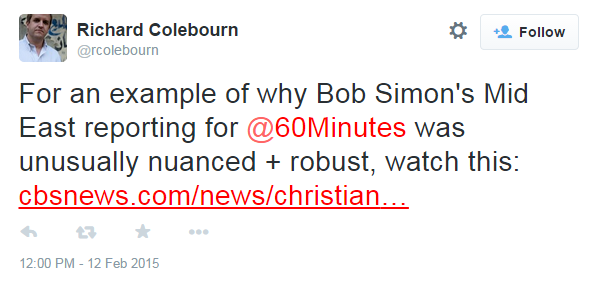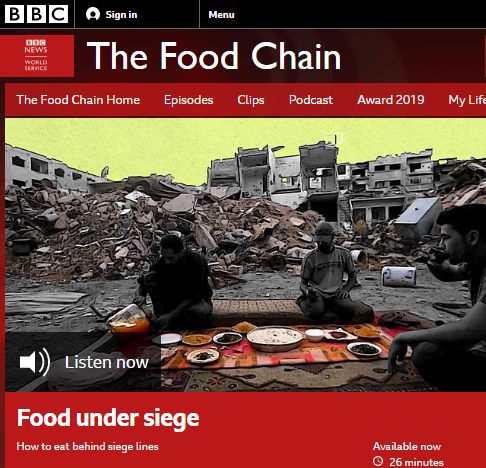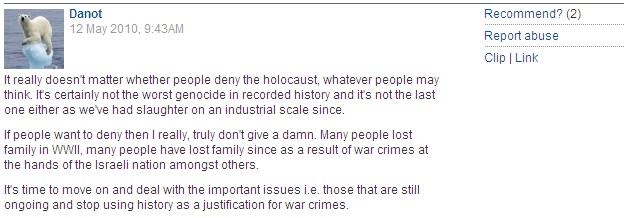On March 10th a link to an article appeared on the BBC News website’s Middle East page under the heading “Palestinian-Jordanian shot at border”.
The link led to a report headlined “Palestinian-Jordanian man shot dead at border crossing” which related to an incident that took place earlier in the day at the Allenby Bridge border crossing in which a man travelling from Jordan attacked a member of the security forces and tried to snatch a gun. 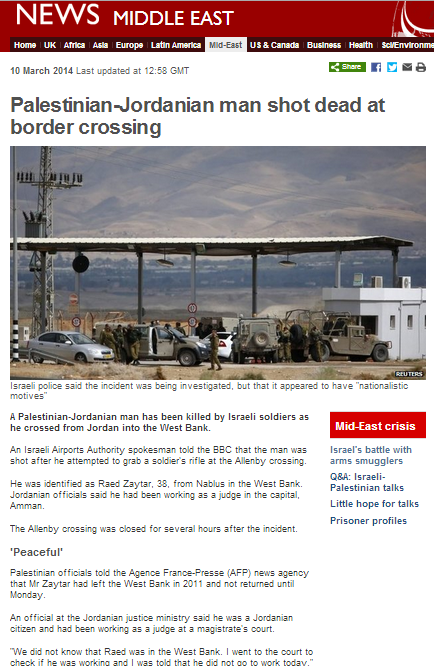
” “The preliminary conclusion of the investigation indicates that the terrorist attacked the soldier. He charged at the soldiers with a metal pole shouting ‘Allah Akbar,’ and then attempted to seize a soldier’s weapon, prompting the soldiers to respond by firing towards his lower extremities, in line with standard operating procedures,” the IDF said in a statement.
“The suspect then began to strangle a soldier and the force resorted to using live fire once again.” “
The BBC report was amended once after its initial publication, but then disappeared completely from the Middle East page several hours later.
A day later, on March 11th, a different article concerning the same incident appeared on the BBC News website’s Middle East page under the title “Israel expresses regret over death of Jordanian judge“. The previous day’s BBC report on the subject does not appear in the “more on this story” section at the bottom of the article.
The 624 word report devotes 106 words to the subject of the expression of regret and condolences issued by the Israeli prime minister’s office the day following the incident. A further eighty-seven words report the results of the IDF’s initial investigation into the incident.
Although it took place at an international border crossing where – as is of course the case in the rest of the world – entrants are stopped for security and passport checks, the BBC report misleadingly describes the incident as having occurred at “a checkpoint” and fails to clarify to readers that the fact that the bus was “stopped” was entirely routine.
“Mr Zaytar was on board a bus that transports people across the Allenby Bridge crossing with about 50 others on Monday morning when it was stopped by Israeli soldiers at a checkpoint.” 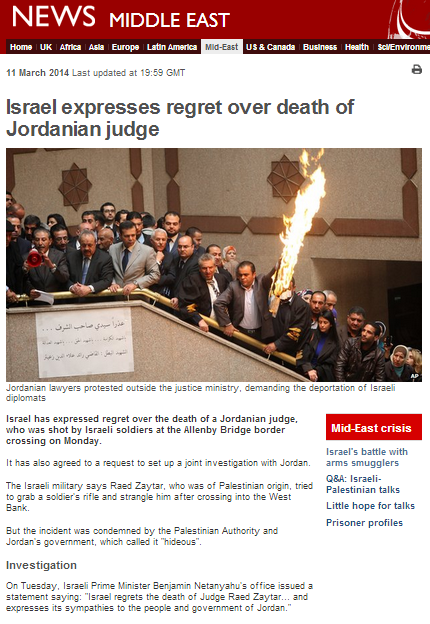
Ninety words of the BBC’s report are devoted to the quotation of an unverified, anonymous, second-hand account of the event previously published the Palestinian news agency Ma’an (which recently revived the ‘Protocols of Zion’ on its pages) and eighteen words to Palestinian Authority statements. Ninety-five words are used to describe various official Jordanian reactions to the incident but no mention is made of the fact that a disturbance took place outside the Israeli embassy in Amman.
“The protesters burned the Israeli flag and shouted “Expulsion of the ambassador is a national duty.”
They also demanded the cancellation of the peace agreement and the release of Ahmed Daqamseh, who murdered seven Israeli schoolgirls in Naharayim in 1997.”
And:
“Riot police were able to control the crowds, according to embassy commissioner Haim Assaraf, who told Israel Radio that everyone at the mission was safe. Jordanian media reported earlier that the protesters had attempted to break into the embassy compound, and that staff were trapped inside for hours.”
Likewise, no attempt is made by the BBC to facilitate audience understanding of the various Jordanian reactions by placing them within the very relevant context of that country’s internal political situation and the dynamics at work there over the past three years since the regional uprisings began.
One hundred and forty-four words of the report’s words relate to unconnected incidents, one of which took place on March 11th in the southern Gaza Strip when members of the Palestinian Islamic Jihad fired a mortar at an IDF patrol engaged in routine location of improvised explosive devices along the border fence. Israeli forces responded and three PIJ terrorists were killed.
The BBC, however, chose to amplify the version of the story as told by one internationally recognized terrorist organization, followed by the airbrushing of the terrorist designation of another, together with an unqualified statement concerning its terror activity .
“Islamic Jihad’s military wing, the al-Quds Brigades, said the men had been trying to prevent “an Israeli incursion east of Khan Younis”.
The group has sporadically fired rockets and mortars at Israel, while Gaza’s ruling Hamas movement has refrained from firing rockets since a 2012 ceasefire with Israel.”
The article closes with a reference to another incident which took place on March 10th near Beit El when a Palestinian man throwing rocks at vehicles on Route 60 was shot and killed. As usual, no attempt is made by the BBC to place that incident in the context of the overall rise in rock-throwing incidents in particular and terror attacks in general in Judea & Samaria in recent months.
The earlier BBC article of March 10th also concluded with a report on an unrelated topic.
“In a separate development on Monday, an Israeli court sentenced an Israeli-Arab man to 25 years in prison for a bomb attack on a bus in Tel Aviv that wounded 26 people.
Mohammed Mafarja, 19, pleaded guilty to charges included attempted murder in connection with the attack in November 2012, at the end of an eight-day conflict between Israel and Palestinian militants in Gaza.”
Readers will no doubt recall that at the time, the BBC had a spot of bother defining that incident correctly.


